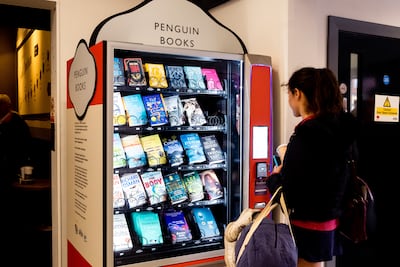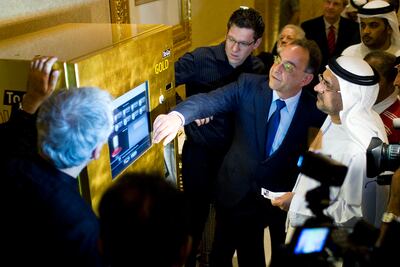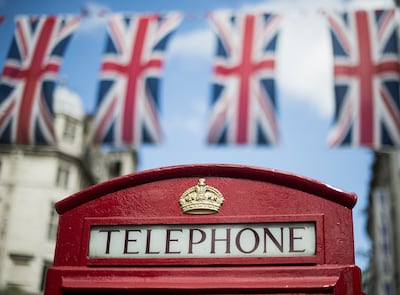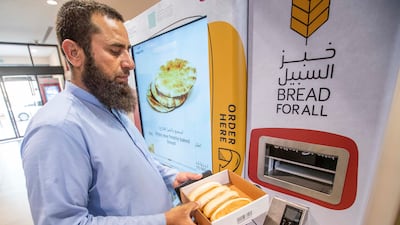The world’s first vending machine was invented in ancient Greece by mathematician Hero Alexandria to dispense holy water.
Over the centuries the concept hasn’t changed, although the technology has, with today's vending machines back at the forefront of revolutionising consumer choice.
In modern times we think of vending machines as offering coffee and snacks, but brands are now taking them a step further and the data they provide has become a valuable part of the retail landscape.
In the UK, Penguin Random House recently revived its book vending machines and placed one in Exeter St Davids train station in the south of England. The move went viral and the publishers were applauded for finding a way to put its books in the path of new customers.
It was while waiting for a train back to London from St Davids in 1934, after visiting famed novelist Agatha Christie, that Sir Allen Lane decided to found Penguin Books, having struggled to find something to read on his journey.
He decided to put books in vending machines at stations for commuters, installing the first, known as the Penguin-cubator, in London's Charing Cross in 1937.
Now the company is reviving their use.
"Whiling away your time with a book is one of the great pleasures of train travel and this machine is just what our founder Allen Lane would have wanted to see as he set off on his journey," said Zainab Juma, head of brand at Penguin.
“When Exeter City of Literature approached us about the Penguin Books vending machine, we knew immediately that it was the perfect way to celebrate our origins."

With advances in technology, instead of just being a convenient way to buy goods 24/7, vending machines are also now a vehicle for collecting data and are able to give a real-time reflection of consumer trends.
David Llewellyn, chief executive of the UK's Vending and Automated Retail Association, told The National the world of vending has been transformed over the past decade.
“The main part of the UK operation is coffee, 60 per cent is driven by it, and we have certainly seen a number of changes,” he said.
“Certainly in the UK people are used to having a range of different coffees, now they can get fresh roasts, fresh milk, oat and almond milk, it has come a long way from the freeze-dried coffee once offered.
"Things are changing all the time and from once assuming vending machines were for hot drinks, now anything you can think of can be sold in them.
"People are living healthier lifestyles and where once sugary drinks were popular we now see people opting for healthier options using the real-time data from the machines."
Mr Llewellyn said advances in technology have transformed the industry.
“To some extent they still look the same, with their glass-fronted screens and the spirals inside, but inside everything has changed with the new technology. It may look like the same old machine but it is completely different,” he said.
“There have been huge changes as people develop new technology to control their stock.
“Computers can now see what stock is needed and where so you don’t have to waste time driving around any more to check stock. It’s more economical and efficient.
“Instead of coins, we see 68 per cent of all transactions are now cashless, it is cost saving and it means the equipment is less vulnerable to being attacked.”
It's not just books that are making a vending machine comeback, other products are being used in them for the first time.
One of the countries leading the way for their innovative use is the UAE, which introduced the world's first gold-vending machine.
Last year during Ramadan, the Aswaaq Al-Mizhar Community Centre in Dubai also set up a free bread-vending machine.
Dubai's Roads and Transport Authority's created the programme, which was one of the projects of the Mohammed bin Rashid Al Maktoum Global Initiatives, to help disadvantaged families.
Known as silent salesmen, vending machines have come a long way from their humble beginnings and now form a £2.2 billion ($2.75 billion) industry in the UK.

The vending machine as we know it today was invented and patented in the West Yorkshire city of Wakefield and first sold stamps at train stations.
It swiftly developed and became more commonly known as a device for obtaining hot drinks.
Today, the machines dispense two million cups of tea and eight million cups of coffee a day.
They form part of the six billion products dispensed every year.
Fresh flowers, bread and gold are available in vending machines
In February, planning permission was applied to transform two decommissioned red phone boxes in London’s West End into vending machines.

“The market continues to develop,” Mr Llewellyn said.
“We have seen an increase in sales of snacks that are healthier for you. We have seen a 147 per cent increase in the amount of drinks offering less than five grams of sugar.
“As people have changed their food preferences it has been reflected in the vending machines. We see new trends first hand.
“There are a couple of large operators internationally, but the rest are small firms, often family run and they deal in specific areas, from traditional coffee to more and more fresh food, to PPE equipment with masks and sanitisers to ear defenders, drill parts and safety boots and ones selling laptops.
“There are a wide range of products now from book vending to travel pillows, SIM cards and phone chargers to fresh flowers. Gold in Dubai and in France we have ones that vend fresh baguettes.”
In Japan consumers use them to buy eggs and bananas, in farms across the UK they are being used to dispense fresh milk and in Dubai Cake ATM sells muffins 24 hours a day at Marsana, on Hudayriyat Island’s leisure and entertainment district.
Vending firms bounced back from Covid by offering micro markets
Like many industries, vending machine businesses were also hit hard by Covid.
“It was hit hard because people were not using them at stations, airports and offices during the pandemic,” he said.
“About 85 per cent of the machines are in places of work.”
But as businesses changed their working models due to the pandemic, it led to a new area for vending machines to excel.
“In other ways Covid allowed vending machines to come into their own,” he said.
“Offices once had large canteens and now we have smart vending machines offering micro markets and hot food 24 hours a day, which a traditional canteen cannot do.
“They really are transforming the way we access services.”
From art-vending machines in the US to gift-wrapped presents from S*uce in Dubai’s Village Mall, Mr Alexandria probably never expected his bronze-coin-operated holy water dispenser to revolutionise modern-day shopping in the way it has.
“If I knew what the next breakthrough in vending would be, I’d be rich,” Mr Llewellyn said.
“It has come so far and is changing all the time so I know there will be exciting things to come.”


